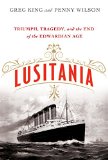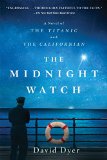Summary | Excerpt | Reviews | Beyond the book | Read-Alikes | Genres & Themes | Author Bio

Triumph, Tragedy, and the End of the Edwardian Age
by Greg King, Penny WilsonOn the 100th Anniversary of its sinking, King and Wilson tell the story of the Lusitania's glamorous passengers and the torpedo that ended an era and prompted the US entry into World War I.
Lusitania: She was a ship of dreams, carrying millionaires and aristocrats, actresses and impresarios, writers and suffragettes – a microcosm of the last years of the waning Edwardian Era and the coming influences of the Twentieth Century. When she left New York on her final voyage, she sailed from the New World to the Old; yet an encounter with the machinery of the New World, in the form of a primitive German U-Boat, sent her – and her gilded passengers – to their tragic deaths and opened up a new era of indiscriminate warfare.
A hundred years after her sinking, Lusitania remains an evocative ship of mystery. Was she carrying munitions that exploded? Did Winston Churchill engineer a conspiracy that doomed the liner? Lost amid these tangled skeins is the romantic, vibrant, and finally heartrending tale of the passengers who sailed aboard her. Lives, relationships, and marriages ended in the icy waters off the Irish Sea; those who survived were left haunted and plagued with guilt. Now, authors Greg King and Penny Wilson resurrect this lost, glittering world to show the golden age of travel and illuminate the most prominent of Lusitania's passengers. Rarely was an era so glamorous; rarely was a ship so magnificent; and rarely was the human element of tragedy so quickly lost to diplomatic maneuvers and militaristic threats.
This book is amazing. I knew just a little about the sinking of the Lusitania and after reading this book I feel as if I were there on the ship. The rich details and tremendous research that obviously went into writing this book make for great reading…I have never read a book before where I felt that it was happening to me. This book really is remarkable...continued
Full Review
(864 words)
This review is available to non-members for a limited time. For full access,
become a member today.
(Reviewed by First Impressions Reviewers).
 Greg King and Penny Wilson's Lusitania commemorates the 100th anniversary of the sinking of the great ship by exploring its glamorous passengers and the fateful torpedo that highlighted a microcosm of the elegant Edwardian era and possibly initiated the U.S. involvement in World War I (WWI).
Greg King and Penny Wilson's Lusitania commemorates the 100th anniversary of the sinking of the great ship by exploring its glamorous passengers and the fateful torpedo that highlighted a microcosm of the elegant Edwardian era and possibly initiated the U.S. involvement in World War I (WWI).
In 1915, after the beginning of WWI, a German U-boat torpedoed and sunk the RMS Lusitania, a British ocean liner. It was the 101st trip RMS Lusitania had made across the Atlantic Ocean. Its first trip was in 1907. More than 1100 people were killed. Why did this tragedy happen? And did it prompt the U.S. to get into the war?
 President Woodrow Wilson had pledged neutrality when the war began, and public opinion in the U.S. was in agreement. But soon...
President Woodrow Wilson had pledged neutrality when the war began, and public opinion in the U.S. was in agreement. But soon...
This "beyond the book" feature is available to non-members for a limited time. Join today for full access.

If you liked Lusitania, try these:

The Mysterious Case of Rudolf Diesel
by Douglas Brunt
Published 2024
The hidden history of one of the world's greatest inventors, a man who disrupted the status quo and then disappeared into thin air on the eve of World War I - this book answers the hundred-year-old mystery of what really became of Rudolf Diesel.

by David Dyer
Published 2017
David Dyer's The Midnight Watch is a powerful and dramatic debut novel - the result of many years of research in Liverpool, London, New York, and Boston, and informed by the author's own experiences as a ship's officer and a lawyer.
Be careful about reading health books. You may die of a misprint.
Click Here to find out who said this, as well as discovering other famous literary quotes!